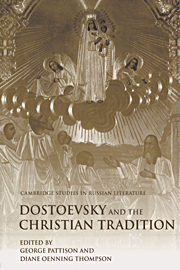Book contents
- Frontmatter
- Contents
- Notes on contributors
- Acknowledgments
- Notes on conventions and abbreviations
- Introduction: Reading Dostoevsky religiously
- PART I DOSTOEVSKY AND THE PRACTICE OF ORTHODOXY
- PART II DOSTOEVSKY AND CHRISTIAN THEOLOGY
- PART III READING DOSTOEVSKY RELIGIOUSLY: CASE STUDIES
- 9 Towards an iconography of Crime and Punishment
- 10 Pavel Smerdyakov and Ivan Karamazov: The problem of temptation
- 11 Beyond the will: Humiliation as Christian necessity in Crime and Punishment
- 12 Freedom's dangerous dialogue: reading Dostoevsky and Kierkegaard together
- Bibliography
- Index
- CAMBRIDGE STUDIES IN RUSSIAN LITERATURE
11 - Beyond the will: Humiliation as Christian necessity in Crime and Punishment
Published online by Cambridge University Press: 02 December 2009
- Frontmatter
- Contents
- Notes on contributors
- Acknowledgments
- Notes on conventions and abbreviations
- Introduction: Reading Dostoevsky religiously
- PART I DOSTOEVSKY AND THE PRACTICE OF ORTHODOXY
- PART II DOSTOEVSKY AND CHRISTIAN THEOLOGY
- PART III READING DOSTOEVSKY RELIGIOUSLY: CASE STUDIES
- 9 Towards an iconography of Crime and Punishment
- 10 Pavel Smerdyakov and Ivan Karamazov: The problem of temptation
- 11 Beyond the will: Humiliation as Christian necessity in Crime and Punishment
- 12 Freedom's dangerous dialogue: reading Dostoevsky and Kierkegaard together
- Bibliography
- Index
- CAMBRIDGE STUDIES IN RUSSIAN LITERATURE
Summary
The most disturbing message of Dostoevsky's Crime and Punishment is its insistence that humiliation is the necessary precondition for Christian life. In a move that powerfully repels even the Catholic West, much more mainstream Protestantism or existentialism, Dostoevsky forces his characters far beyond a comfortable exercise in the virtue of humility to an abject state of humiliation. Only those individuals who admit the justice of being mocked and despised by all normal-minded people realise clearly enough the truth of human kind's fallen condition honestly to feel the necessity for grace. This theme binds into a remarkable unity characters as different as Marmeladov, Marmeladov's daughter Sonya, Raskolnikov and Svidrigailov. Each character must decide between an assertion of will and complete humiliated acknowledgment of his or her non-being without the creative power of God. The emphasis on true humiliation as true humility is a doctrinal commitment which should not be translated into any psychological category of masochism as a physical or psychic eros. Similarly the conception of humiliation pushes the reader beyond noble tragedy or transcendentalism. The doctrine of self-abnegation does not spring from a diseased psyche but from the Orthodox tradition of apophatic knowledge. It is within that tradition that Dostoevsky's meaning can best be grasped.
Apophatic knowledge, as Bishop Kallistos Ware explains, is a way of knowing that employs negative as well as affirmative statements, saying what God is not rather than what he is. Through this method human beings can describe God's essence or their own only by a set of assertions and negations which admit the incomplete and distorting nature of the ideas asserted.
- Type
- Chapter
- Information
- Dostoevsky and the Christian Tradition , pp. 226 - 236Publisher: Cambridge University PressPrint publication year: 2001



